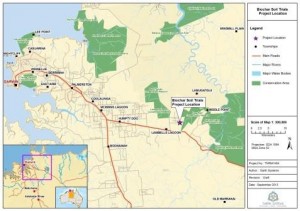Soil test of Northern Territory Pilot project
Introduction
With the help of Territory, the northern territory of the natural resources management council (NRM), and the Australian government’s financial support, the company has conducted a field experiment in Northern Territory to investigate the role of biological carbon in crop yields and soil health in the growing industry.
Biological carbon soil tests carried out in Australia, but mainly concentrated in the southeast and the west, the first time in the northern territory.
Project site
Located in an organic farm near Lambells lake, located in the Litchfield area, the project is located in the southeast of the city of Darwin about 56km. The soil in the project area is mainly sandy loam soil.
Natural resources management board and planting
The northern territory of the planting industry started late but developed rapidly, the state economy has an important contribution. Darwin area is one of the three major growing areas in Northern Territory. Crop varieties in each region need to be adapted to the local climate and other conditions, which are restricted to a limited area of soil and water conditions, in other words, crop growth is subject to limited natural resources.
In the Darwin area, there are likely to be cultivated soil is mostly barren, with low carbon content, water retention capacity and nutrients are not ideal. Farmers are constantly asked to maintain or increase the amount of carbon in the soil to improve the soil’s biological, chemical and physical indicators to help improve crop yields.
What is biological carbon?
Biological carbon is heated by natural organic matter, in a form of a stable charcoal made of high temperature and low oxygen process called pyrolysis. The ancients used biological carbon to improve soil conditions and promote the growth of crops. The results of an increasing number of test results in Australia and around the world have proved that the results of this new method have been found to improve soil conditions.
Why is it good for the growing industry?
It has been known that biological carbon can change the physical, chemical, and biological structure of the soil, and it is believed to be an important sustainable agricultural investment:
Sales and improve the effectiveness and efficiency of fertilizer;
An increase of stable carbon levels in soil;
An improvement of soil water and fertilizer retention capacity;
Sales and improve the yield and yield of crops;
An increase in the reduction of the soil acidity, cation exchange capacity;
Sales promotion benefit the growth of soil microorganisms.
Literature shows that the impact of carbon on soil properties and crop yields depends on a range of factors, including: the type of carbon, soil and crop types, agricultural systems, and climate change.
In addition, by disposing of waste wood, the production of biological carbon may also contribute to sustainable waste management, for example, agricultural waste or invasive species into valuable agricultural resources





